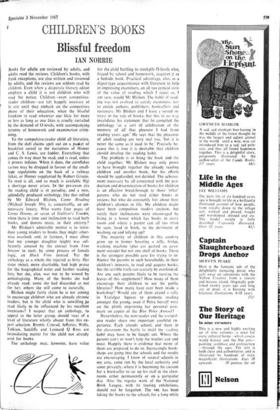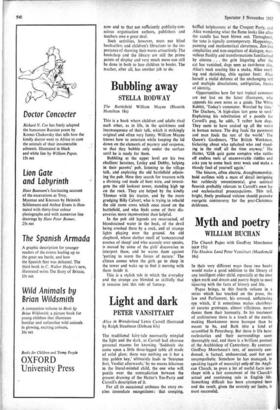Blissful freedom CHILDRPN'S BOOKS
IAN NORRIE
Books for adults are reviewed by adults, and adults read the reviews. Children's books, with freak exceptions, are also written and reviewed by adults, and the reviews are seldom read by children. Even when a desperate literary editor employs a child it is not children who will read the notice. Children—even compulsive- reader children—are left happily unaware of lit crit until they embark on the competitive phase of their education, when the blissful freedom to read whatever one likes for more or less as long as one likes is cruelly curtailed by the demand of 0-levels, with accompanying tyranny of homework and examination cram- ming.
To the compulsive-reader child all literature, from the daft claims spelt out on a packet of breakfast cereal to the narratives of Homer and C. S. Lewis, are fodder. Everything that comes its way must be read, and is read, unless it proves tedious. When it does, the cornflakes carton may be dropped in favour of the small- type regulations on the back of a railway tieket, or Homer supplanted by Robert GraVes. To read is all, and so much is available that a shortage never arises. In the pre-exam era the reading child is in paradise, and a new, splendidly produced anthology, like that edited by Mr Edward Blishen, Come Reading (Michael Joseph 30s), is, conceivably, an un- necessary luxury. Who wants four pages of Lorna Doane, or seven of Gulliver's Tram,ls, when there is time and inclination to read both books, and dozens more, in their entirety?
Mr Blishen's admirable motive is to intro- duce young readers to books they might other- wise overlook and, in fairness, I must allow that my younger daughter (eight) was suf- ficiently amused by the extract from Tom Sawyer to start, by some process of female logic, on Huck Finn instead. Yet the anthology as a whole she rejected as bitty. Her sister (nine), more charitable, had high praise for the biographical notes and further reading lists, but she, also, was not to be wooed by anthologising. Many of the books she had already read; some she had discarded as not for her; others she will come to naturally.
Blishen might fairly claim he is not aiming to encourage children who are already chronic readers, but is the child who is unwillinglo read likely to be influenced by his excellent intentions? I suspect that an anthology, to appeal to the latter group, should treat of a level of literature wholly absent from this ex- pert selection. Brontë, Conrad, Jefferies, Wells, Tolkien, Sutcliffe and Leonard Q Ross are intimidating matter for the child not already avid for books.
The anthology may, however, have value for the child battling to stockpile 0-levels who, frayed by school and homework, acquires it as a bedside book. Practical advantage, also, as a digest-type acquaintance with literature to help in impressing examiners, an all too cynical view of the value of reading which I reject as, I am sure, would Mr Blishen. The habit of read- ing was not evolved to satisfy examiners, nor to enrich authors, publishers, booksellers and reviewers. Mr Blishen and I have a vested in- terest in the sale of books, but this in no way invalidates his statement that he compiled the anthology 'as a sort of celebration of the memory of all that pleasure I had from reading years ago.' He says that the pleasures of adult reading are very real too, but it is never the same as it used to be.' Precisely be- cause this is true it is desirable that children should develop the reading habit.
The problem is to bring the book and the child together; Mr Blishen may only prove to have brought together the already reading children and another book, but his efforts should be applauded, not derided. The achieve- ment necessary by all concerned with the pro- duction and dissemination of books for children is an effective breakthrough to those 'other' parents who do not read either books or reviews but who do constantly fret about their children's chances in life. My children niight have been compulsive readers anyhow, but surely their inclinations were encouraged by living in a house which has books in every room and where a parent can all too often be seen, head in book, to the detriment of washing up and tidying up?
The majority of Children in this country grow up in homes boasting a telly, fridge, washing machine (plus car parked on pave- ment outside) but not one shelf of books. There is the strongest possible case for trying to in- fluence the parents in such households, in their children's interests, to read and acquire books, but the terrible truth can scarcely be overlooked. Are any such parents likely to be turning the leaves of this supplement? How many of them encourage their children to use the public libraries? How many have ever been inside a bookshop? Would any of them attend a rally in Trafalgar Square to promote reading amongst the. young, even if Petra herself were on the plinth imprinting her personal paw- mark on copies of the Blue Peter Annual? - Nevertheless, the non-reader and the compul- sive reader share one important youthful ex- perience. Each attends school, and there in the classroom the battle to instil the reading habit may have to be fought out. Where the parents can t or won't help the teacher can and must. Happily there is evidence that many of them are prepared to do so. Increasingly book- shops are going into the schools and the results are encouraging. I know of several schools in my area, some run by the local authority and some privately, where it is becoming the custom for a bookseller to set up his stall in the class- room, either permanently or on a particular day Also the regular work of the National Book League, with its touring exhibitions, should not be forgotten. The Nat has been taking the books to the schools for a long while
now and to that not sufficiently publicity-con- scious organisation authors, publishers and teachers owe a great deal.
Such activities, however, must not blind booksellers and children's librarians to the im- portance of showing their wares attractively. The bookshop and the library are still the prime points of display and very much more can still be done in both to lure children to books. The teacher, after all, has another job to do.











































 Previous page
Previous page